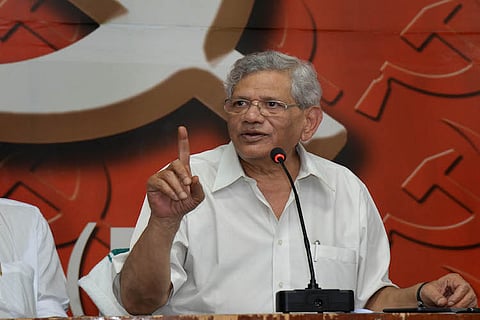

The CPI(M) will conduct an intense nationwide campaign urging people not to provide any answers for questions related to preparing the National Population Register (NPR) as the NPR will form the basis for the National Register of Citizens (NRC). The party will soon begin a house-to-house campaign explaining the NPR-NRC linkage, asking people to answer the census questions but not provide details for NPR.
"Census is about the number of people living in India while NPR is about the citizenship of India. Both are different. The party will also call upon the chief ministers opposing the NRC, like the state governments of Kerala and Punjab have done," CPI(M) General Secretary Sitaram Yechury said.
He was addressing the media in Thiruvananthapuram on Sunday, post the 3-day long Central Committee meeting of the party.
"As per the amendment passed by the earlier BJP government of Atal Bihari Vajpayee in 2003, the NPR has to be compiled which will be the basis for the NRC. The Central Committee called upon the people not to answer any questions concerning the NPR when the enumerators come to their houses. The enumerators will have two sets of questions, while the questions related to the Census may be answered, the questions related to the NPR must not be answered, " he said.
The house-to-house campaign will culminate on March 23 marking the martyrdom of Bhagat Singh, Rajguru and Sukhdev. The party will also demand dismantling of the existing detention centres and stopping construction of new ones and called upon all state governments not to construct such detention centres.
"People should be allowed to live where they used to be," Yechury said.
Yechury also opined that it's a very mature reaction considering the diversity and complexity of the country to have individual protests as well, and not to be always part of a joint protest.
"It's not a failure not to have a joint protest all the time. We will protest independently as well and will join other protests when needed. It's amazing to see the youth on the streets. We will support such protests rather than asking them to come and join our protests" he added.
On Governor Arif Mohammed Khan
On the ongoing spat of the Kerala government with Governor Arif Mohammed Khan, he said that as per the Constitution, there was no need to seek the Governor's permission for moving the Supreme Court against the CAA.
"The role of Governor as a representative of the President is a legacy of colonial rule. Why should there be such a post in independent India? The role of the Governor is clearly defined in independent India,” he said.
On imposing UAPA on two youth
"Unlawful Activities (Prevention) Act (UAPA) can be imposed on someone without even consulting the state government," Yechury said, while reacting to queries on the arrest of two youth from Kozhikode under the UAPA.
He said that the Central Committee meeting didn't discuss that.
20-year-old Alan Suhaib and 24-year-old Thaha Fazal, both Law students, had been arrested under UAPA allegedly for distributing pro-Maoist pamphlets.
When asked why the police in a state ruled by the CPI(M), a party which has been vehemently opposing such laws, booked two people under UAPA, Yechury said the police was following the law.
“Now the state government’s role will come when there will be a review of the charges,” he said.